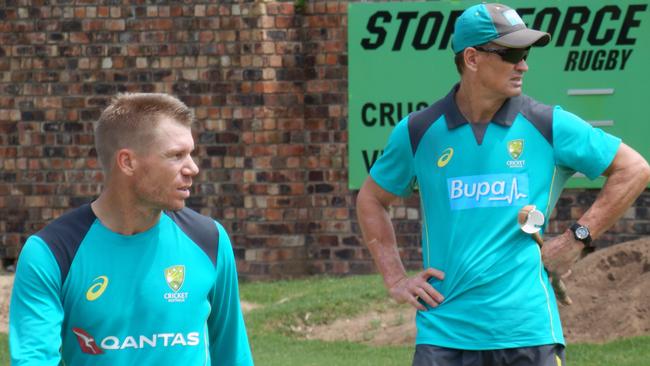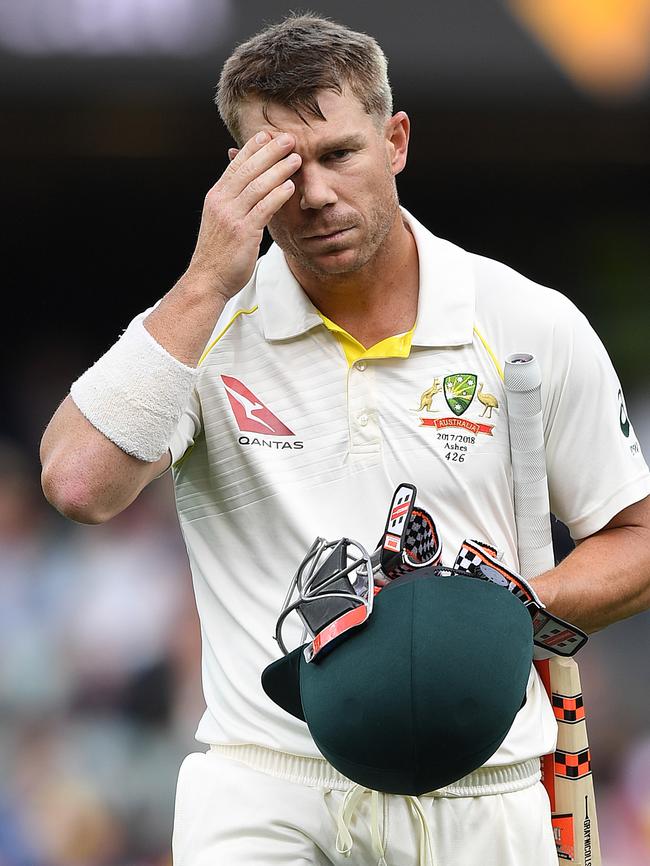South Africa v Australia: Board could strip Dave Warner of vice-captaincy
David Warner’s troubles are far from over with the possibility he may face further sanction.

Dave Warner’s troubles are far from over with the possibility he may face further sanction, including losing his vice-captaincy, when the Cricket Australia board meets today.
The role of Darren Lehmann and other senior team leaders may also be examined as the directors assess the fallout from the events in the first Test at Kingsmead.
The controversy is not listed as a specific agenda item for the board meeting, but sources told The Australian there was likely to be a general discussion rather than examination of Warner.
Chief executive James Sutherland has not said anything publicly about the events which resulted in Warner being fined 75 per cent of his match fee and receiving three demerit points.
There has been a significant backlash among sections of the public about the behaviour of the Australian side.
Nathan Lyon was also fined part of his match fee for dropping the ball on AB de Villiers in a run-out celebration that players have admitted was over the top.
Warner has been on his best behaviour for two years, but lost control when Quinton de Kock made disgraceful comments about his wife, Candice, who is in South Africa with the couple’s two children.
De Kock was fined for his role in the affair and Warner was contrite when he spoke for the first time yesterday.
Both Lehmann and Steve Smith have backed the opener, who is encouraged to be aggressive on the field. The match referee spoke to both sides ahead of tomorrow’s second Test at Port Elizabeth and Smith addressed the team about the issue separately.
“It’s about continuing to play a good, hard aggressive brand but knowing we don’t want to cross the line,” he said. “We want to stay within the spirit of the game and let cricket be the main thing on show. I think obviously this game hasn’t been great for us — the things that went on. But in the last two years I think we’re the team with the least indiscretions — code of conduct or anything.

“We’ve played the game in a pretty good way. It’s the Australian way to try to play the game hard, aggressively, and stay within the boundaries. This week we probably went outside those boundaries on a couple of occasions — and that’s not what we are about. But we’re going to continue to play hard, aggressive cricket.
“As captain you take responsibility of your team and what’s going on, so I do take responsibility for that. whether I could have done anything to change the events of what happened. I’m not sure, but I do take responsibility.”
Warner was contrite when he spoke, but said his family is off limits — a rule that most international players appear to accept.
“I’ve accepted that the way it was played out was regrettable, I’ve stated that, and hopefully in the future if I’m going to respond emotionally, I would try to do it in a more appropriate manner and walk upstairs,” he said.
“You have seen the past 18-24 months how I conduct myself on the field. What happened the other day was not appropriate and I responded a tad emotionally.”
Warner’s problems run deep at head office. He accepted the role as team spokesman during last year’s pay dispute — just as he accepts the role of attack dog on the field — and the bitterness among some at board level runs deep following that bruising encounter.
Warner has not been disciplined for any indiscretions since the World Cup in 2013.
Lehmann, who gave no quarter on the field as a player and copped his own sanctions at the time, backed the opener after the match.
“We’re certainly supporting David,” he said. “We want to play in a way that gets us success and we’ve just got to make sure we don’t cross the line, that’s the key.”
The problem for the side is that it is focused solely on winning while the board and administration is conscious of the brand. Tired of public backlash, it encouraged a commitment to “the spirit of cricket” in the Steve Waugh era, but these days the talk among players is more about “the line”. Lyon, another of the on-field enforcers, often talks about “headbutting the line”.
There is a precedent for the board stepping in to punish players. It occurred in South Africa in 1994. Unhappy with the severity of fines levelled at Merv Hughes and Shane Warner by the ICC, head office increased their sanctions and made it clear they were unhappy with Hughes, who smashed his bat into the race in reaction to abuse from fans. Chairman Alan Crompton rebuked Hughes and said: “The board has made it very clear that restraint in the face of provocation should be part of the professionalism required to be demonstrated by every Australian cricketer.”
In 2000 the board stripped Warne of the vice-captaincy for sending lewd messages to an English nurse.




To join the conversation, please log in. Don't have an account? Register
Join the conversation, you are commenting as Logout